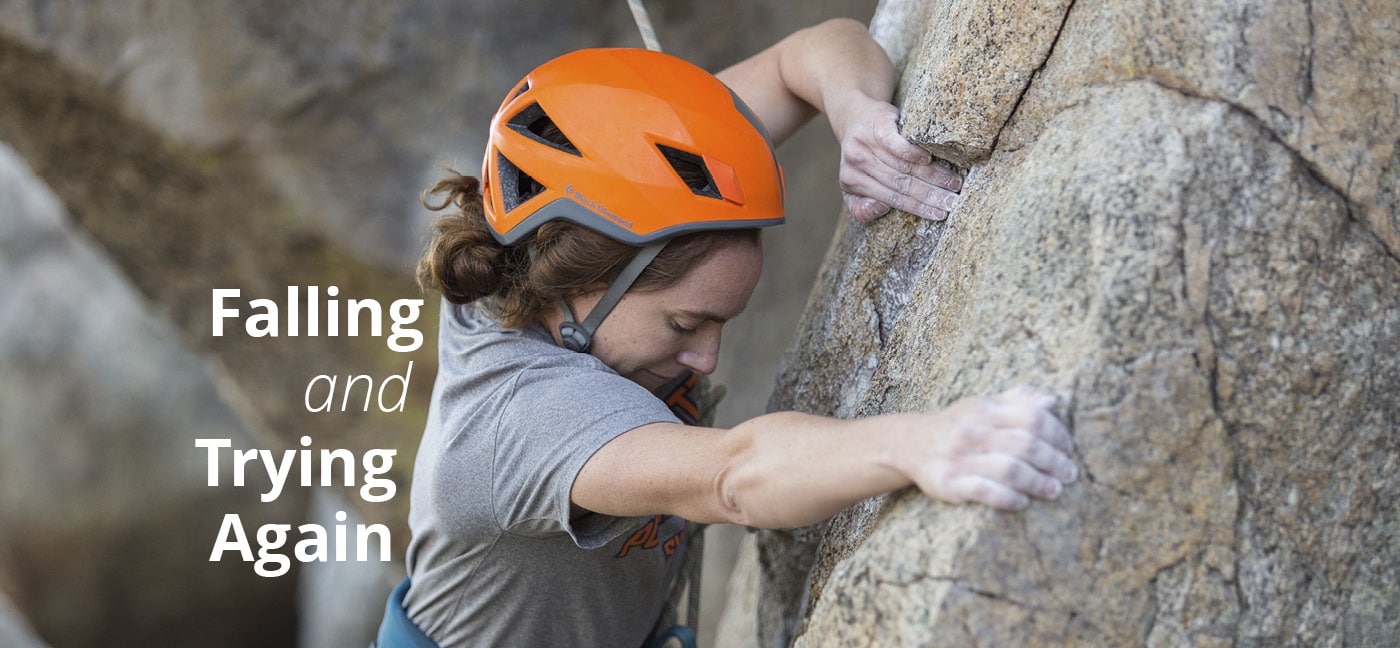Falling and Trying Again
Madeleine Campbell

Failure isn’t just an inevitable part of life, it’s an essential one. No child gets on a bike and rides down the block on their very first try. Nobody gets through life without scraped knees or wounded souls. We are here to learn, and learning consists of falling and getting back up and falling and getting back up again. As Oliver Goldsmith wrote, “Our greatest glory is not in never falling, but in rising every time we fall.“
I know several variations of that quote, and I believe them all. However, as a fairly anxiety-ridden person, I am all-too-aware that logically knowing failure is important and okay doesn’t eliminate my fear of it.
When I was young, my family went on frequent camping trips to the Valley of Fire State Park near Las Vegas. On one of the trips there, I climbed up a steep section of rock. Halfway up, I found myself on an especially narrow ledge. When I looked down, my youthful spirit of adventure shriveled up. I was suddenly gripped by dizzying, throat-slamming terror. I called to my mom, and told her I couldn’t finish because I was going to fall. She told me that it was alright; if I fell, she’d catch me. I don’t even remember if I fell, jumped down to her, or kept climbing. What mattered most was that I wasn’t scared anymore. I was free to act without the fear of failure.
Another time I attempted a cartwheel outside of the safety of my gymnastics class. I hit a table and nearly broke my nose. I ran home where my mother laid me down, wrapped some ice in a washcloth, and told me it would be alright.
As a kid, the world was full of big, scary things. Yet, when I had someone to fall back on – to catch me if I fell or to comfort me afterward – I was better able and willing to try out the world.
Supportive parenting from heaven
I was diagnosed with a severe anxiety disorder when I was a teenager. That’s when everything became terrifying. Even the very idea of leaving the house filled me with narrow-ledge terror. What if I said the wrong thing and people thought I was stupid? What if I did the wrong thing and they thought I was weird? I was sure people would see all the things I thought were wrong with me. I even dropped out of school. I started therapy and medication, both of which helped. Yet, terror served as a paralytic, and that was something my parents couldn’t protect me from or console away.
One of the most important functions of parenting, when it’s done well, is to help us form our idea of, and model our relationship with, God. Faith in God works like faith in supportive parents. Trusting in a higher power, something greater outside of ourselves, can bring confidence that, unfailingly, as long as we are trying our best to do and be good, we don’t have to be afraid of falling. Either we have someone to catch us or someone to console us.
My relationship with my parents was formed through loving interaction as we spoke and spent time together. I knew who they were, how strong they were. It took years for me to form a similar relationship with God, in similar ways. My faith started to mean something, and to better my life.
Having faith can bring confidence
As adults, breaking bones and skinning knees are seldom the failures we fear.
Sometimes we can’t find confidence in ourselves or our abilities. I finally learned to find confidence in a higher power rather than myself alone. I trusted God and let Him know I was doing my absolute best. So, when I fell, I knew I was falling into His arms. As my faith grew, so did my willingness to risk failure, and my ability to view it as a part of life rather than proof I was somehow flawed.
I’m still scared sometimes. I just moved to a new place, just switched majors. Those were big risks, and either of them could have gone badly. They haven’t so far, and I am supported in knowing God, and that He is there for me. I trust Him with the decisions I make. I trust that no matter how many falls I take, they’re leading me somewhere I want to go.
![]()